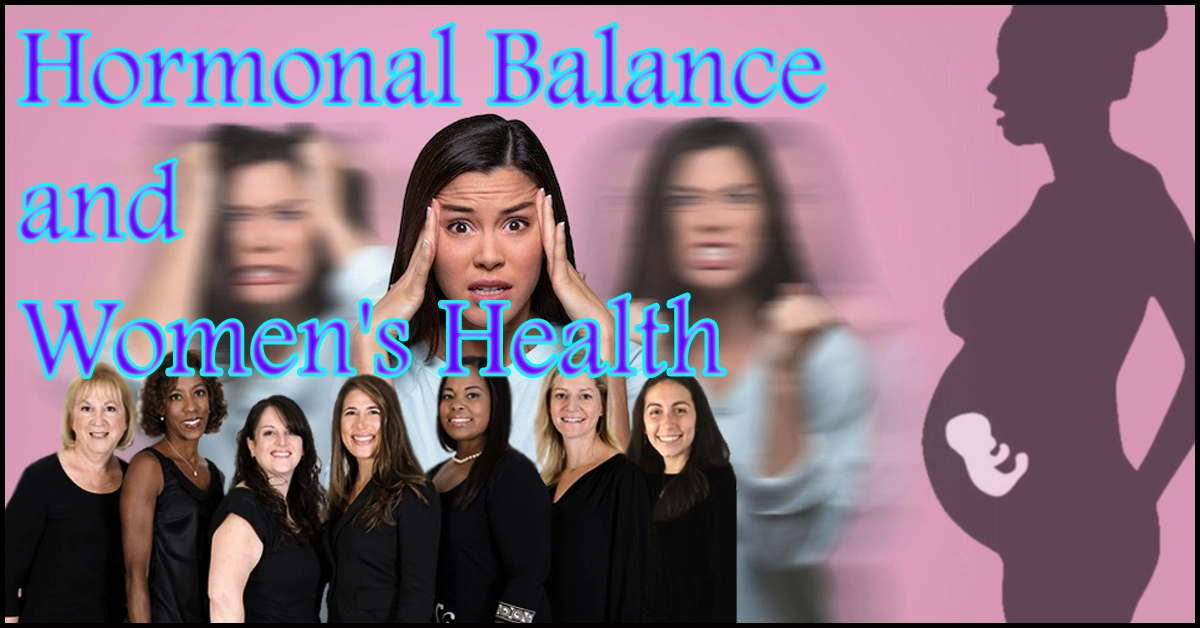
Hormonal balance and women's health
Hormonal balance is crucial to women’s health and overall well-being. Hormones play a vital role in regulating many bodily processes, including metabolism, growth and development, and reproductive function. When hormones are in balance, women are more likely to experience good health and vitality. However, hormonal imbalances can cause a range of symptoms and health problems, affecting physical, emotional, and mental health.
This essential guide aims to provide an overview of hormonal balance and its impact on women’s health. We will discuss the menstrual cycle and hormonal changes, common hormonal imbalances, hormonal changes during pregnancy and menopause, the connection between hormonal imbalance and mental health, strategies for promoting hormonal balance naturally, medical treatments for hormonal imbalances, and the impact of hormonal imbalances on women’s reproductive and thyroid health. By the end of this guide, women will be empowered to take control of their hormonal health and well-being.
The Menstrual Cycle and Hormonal Changes
The interaction of several hormones occurs during the intricate process of the menstrual cycle. It is controlled by the hypothalamus and pituitary gland in the brain, which signal the ovaries to release hormones that prepare the uterus for pregnancy.
Three stages make up the menstrual cycle: the three phases are luteal, follicular, and ovulation. During the follicular phase, follicle-stimulating hormone (FSH) and luteinizing hormone (LH) are released, stimulating the growth and development of a follicle in the ovary. This follicle contains an egg that will be released during ovulation.
Ovulation occurs when the mature follicle ruptures and releases the egg into the fallopian tube. This is triggered by a surge in LH, which also causes the production of progesterone.
During the luteal phase, progesterone levels rise to prepare the uterus for pregnancy. If the egg is fertilized, it will implant in the uterus and begin to develop. If it is not fertilized, hormone levels will decrease, and the uterus will shed its lining in the form of a menstrual period.
Hormonal imbalances can disrupt the menstrual cycle, causing irregular periods, heavy bleeding, or other symptoms. Common hormonal disorders that affect the menstrual cycle include polycystic ovary syndrome (PCOS), thyroid disorders, and pituitary disorders. Women can support their menstrual health by maintaining a healthy weight, managing stress, and incorporating a balanced diet and exercise routine.
Common Hormonal Imbalances in Women: Causes, Symptoms, and Treatment
Hormonal imbalances can occur at any age and can be caused by a variety of factors, including stress, genetics, diet, and medical conditions. Here are some common hormonal imbalances in women, their symptoms, and treatments:
- Polycystic ovarian syndrome: PCOS is a hormonal condition that affects women who are of reproductive age. It is caused by an overproduction of androgens (male hormones) in the ovaries. Which can result in irregular periods, acne, excessive hair growth, and infertility. Treatment may include hormonal birth control, medication to lower androgen levels, and lifestyle changes like weight loss and regular exercise.
- Thyroid disorders: The thyroid gland plays a critical role in regulating metabolism and energy levels. When thyroid hormone levels are too high (hyperthyroidism) or too low (hypothyroidism), women may experience symptoms like fatigue, weight gain, hair loss, and menstrual irregularities. Treatment may include medication to regulate thyroid hormone levels, radioactive iodine therapy, or surgery.
- Adrenal insufficiency: The adrenal glands produce hormones that help regulate stress and inflammation. When they are not functioning properly, women may experience symptoms like fatigue, muscle weakness, weight loss, and low blood pressure. Treatment may include hormone replacement therapy and managing stress levels.
- Menopause: Menopause is a natural transition that occurs when a woman’s reproductive function begins to decline. It is characterized by a decrease in estrogen levels. Which can result in symptoms like hot flashes, night sweats, and mood changes. Treatment may include hormone replacement therapy or other medication to manage symptoms.
You should consult your healthcare professional if you think you could have a hormone imbalance. They can perform diagnostic tests and recommend the appropriate treatment to restore hormonal balance and promote overall health and well-being.
Hormonal Changes During Pregnancy and Postpartum
Pregnancy is a time of significant hormonal changes as a woman’s body prepares to support the growth and development of a baby. These hormonal changes can affect a woman’s physical and emotional health during and after pregnancy. Here are some of the most notable hormonal changes that occur during pregnancy and postpartum:
- Human chorionic gonadotropin (HCG): This hormone is produced by the placenta and is responsible for maintaining the pregnancy. It can cause nausea, vomiting, and fatigue during the first trimester.
- Estrogen and progesterone: These Hormones are produced by the Placenta and help to prepare the uterus for the growing fetus. They can also cause breast Tenderness, mood changes, and fatigue.
- Prolactin: This hormone Stimulates milk production in the breasts and can lead to breast Engorgement and leaking.
- Oxytocin: This hormone is responsible for Stimulating uterine Contractions during labor and delivery. It also plays a role in bonding and Breastfeeding after birth.
After giving birth, Hormonal changes continue as the body adjusts to the Postpartum period. Hormonal changes during this time can cause a range of symptoms, including:
- Postpartum Depression: Hormonal changes can Contribute to the development of Postpartum Depression. Which affects up to 1 in 7 women after giving birth.
- Breastfeeding: Hormonal changes support milk production and can lead to breast Engorgement, leaking, and Discomfort.
- Menstruation: Hormonal changes can cause irregular periods or amenorrhea (lack of Menstruation) for several months after giving birth.
- Hair loss: Hormonal changes can cause hair to fall out after giving birth, although this is usually temporary.
If you experience significant or Persistent symptoms after giving birth, it is important to speak with your healthcare provider. They can provide support and treatment to help you manage your Hormonal changes and promote optimal health and Well-being.
Also Read – Heart disease treatment and prevention
Hormonal Changes During Menopause: What to Expect
The menopause, which signals the end of a woman’s reproductive years, is a natural change. It typically occurs between the ages of 45 and 55, and is characterized by a decrease in estrogen production by the ovaries. This hormonal change can cause a range of physical and emotional symptoms, including:
- Hot flashes: Hot flashes are a sudden feeling of heat that spreads throughout the body, often accompanied by sweating and rapid heartbeat.
- Night sweats: Night sweats are hot flashes that occur during sleep, often leading to disrupted sleep patterns.
- Vaginal dryness: Decreased estrogen levels can cause vaginal dryness and discomfort during sex.
- Mood changes: Anxiety, anger, and mood swings can all be brought on by hormonal fluctuations.
- Insomnia: Sleep disturbances are common during menopause and can be caused by hormonal changes as well as other factors.
- Weight gain: Hormonal changes can contribute to weight gain and changes in body composition.
Treatment options for menopause-related symptoms may include hormone replacement therapy (HRT). Which can help to restore estrogen levels and alleviate symptoms. Other non-hormonal treatments may also be effective, such as lifestyle changes like regular exercise and a healthy diet. As well as medications like antidepressants or sleep aids. Women should work closely with their healthcare provider to determine the best treatment plan for their individual needs and health history.
It is important for women to prioritize their overall health and well-being during menopause and beyond. This includes maintaining a healthy lifestyle, getting regular check-ups and preventative screenings, and seeking medical care if any concerning symptoms arise.
The Connection Between Hormonal Imbalance and Women’s Mental Health
Hormonal imbalances can affect not only a woman’s physical health, but also her mental health. The fluctuations in hormones that occur during various stages of a woman’s life. Such as puberty, pregnancy, postpartum, and menopause, can lead to changes in mood, anxiety, and depression.
During puberty, hormonal changes can contribute to mood swings, irritability, and anxiety. Additionally, conditions like polycystic ovary syndrome (PCOS) can cause hormonal imbalances that are associated with an increased risk of depression and anxiety.
While pregnancy, postpartum, and breastfeeding, hormonal changes can also affect a woman’s mental health. For instance, it is thought that hormonal changes, in addition to other factors like stress and sleep deprivation, are what cause postpartum depression, which can affect up to 1 in 7 women. Similarly, breastfeeding can also impact a woman’s hormonal balance and affect her mental health.
During perimenopause and menopause, hormonal changes can lead to mood swings, anxiety, and depression. This is due to the decrease in estrogen levels. Which can affect neurotransmitters in the brain that regulate mood and emotional stability.
Treatment for mental health concerns related to hormonal imbalances may include therapy, medications, and lifestyle changes such as regular exercise, healthy eating habits, and stress management techniques. Hormone replacement therapy may also be recommended in some cases.
It is important for women to prioritize their mental health and well-being and seek medical care if they experience concerning symptoms. A healthcare provider can provide support, guidance, and treatment options to help women manage their hormonal imbalances and improve their mental health.
Strategies for Promoting Hormonal Balance Naturally: Diet, Exercise, and Lifestyle Changes
Hormonal balance is important for overall health and Well-being in women, and there are several natural Strategies that can help promote healthy hormone levels. These Strategies include:
- Eating a healthy diet: A healthy diet that includes a variety of whole foods, including fruits, Vegetables, whole grains, and lean Proteins, can help promote hormonal balance. Eating foods rich in omega-3 fatty acids, such as fatty fish and nuts, can also be Beneficial for hormone health.
- Regular exercise: Exercise can help promote Hormonal balance by Reducing stress levels and increasing Endorphins. Which can improve mood and overall Well-being. Both aerobic and resistance exercises can be Beneficial for hormone health.
- Stress management: Chronic stress can disrupt Hormonal balance, so finding effective ways to manage stress can be important. Activities such as Meditation, yoga, deep breathing, and spending time in nature can all help reduce stress levels.
- Getting enough sleep: Sleep is important for hormone health, as it is during sleep that the body produces and releases Hormones. Getting at least 7-8 hours of sleep per night can help promote healthy hormone levels.
- Avoiding environmental toxins: Certain Environmental toxins, such as Pesticides, plastics, and chemicals in personal care products, can disrupt Hormonal balance. Avoiding these toxins as much as possible. Such as by Choosing organic produce and natural personal care products, can help promote hormone health.
- Balancing blood sugar: Blood sugar imbalances can lead to insulin resistance and other Hormonal imbalances. Eating a Balanced diet that includes complex Carbohydrates, fiber, and protein can help Regulate blood sugar levels and promote hormone health.
By incorporating these Strategies into their daily lives, women can help promote Hormonal balance naturally and support their overall health and Well-being. It’s important to consult with a Healthcare Provider before making any significant changes to your diet, exercise routine, or Lifestyle.
Medical Treatments for Hormonal Imbalances: When to Consider Hormone Replacement Therapy
In some cases, natural Strategies may not be enough to manage Hormonal imbalances, and medical treatments may be necessary. Hormone Replacement therapy (HRT) is a medical treatment that involves Replacing Hormones that are no longer being produced in the body.
HRT is most commonly used to manage symptoms of Menopause. Such as hot flashes, night sweats, vaginal dryness, and mood changes. It can also be used to manage symptoms of Perimenopause, Postmenopausal, and other Hormonal Imbalances.
HRT can be administered in several forms, including pills, patches, creams, gels, and vaginal rings. It may contain estrogen, progesterone, or both, depending on the individual’s needs.
However, HRT is not Appropriate for everyone. Women with a history of breast cancer, ovarian cancer, blood clots, or stroke may not be candidates for HRT due to the Increased risk of certain Complications. It’s important to discuss the potential risks and benefits of HRT with a Healthcare Provider before starting this treatment.
Other medical treatments for Hormonal Imbalances may include medications to Regulate Menstrual cycles or manage symptoms of conditions such as PCOS. Surgery may also be an option in some cases, such as for women with severe Endometriosis or Fibroids.
It’s important for women to be aware of the signs and symptoms of Hormonal Imbalances and to seek medical care if they experience Concerning symptoms. A Healthcare Provider can provide Guidance on the best treatment options for each Individual’s specific needs and medical history.
Hormonal Imbalances and Women’s Reproductive Health: PCOS and Endometriosis
Polycystic ovary Syndrome (PCOS) and Endometriosis are two conditions that can be Associated with Hormonal Imbalances and can affect women’s Reproductive health.
PCOS is a common condition that affects about 1 in 10 women of Reproductive age. It is Characterized by high levels of Androgens (male Hormones) and insulin resistance. Which can lead to irregular Menstrual cycles, acne, weight gain, and Difficulty getting pregnant. PCOS is often managed with a combination of Lifestyle changes. Such as diet and exercise, and medication to Regulate Menstrual cycles and manage symptoms.
Endometriosis is a condition in which the tissue that lines the uterus grows outside of the uterus, on other organs such as the ovaries, Fallopian tubes, and bladder. This may result in Discomfort, painful periods, and infertility. Endometriosis is often Associated with Hormonal imbalances, including high levels of Estrogen. Treatment for Endometriosis may include pain medication, Hormonal therapy, and surgery.
Both PCOS and Endometriosis can have a significant impact on women’s quality of life and Reproductive health. It’s important for women to seek medical care if they experience symptoms of either of these conditions, and to work with a Healthcare provider to develop a treatment plan that Addresses their individual needs and goals.
Thyroid Health and Its Impact on Hormonal Balance
The thyroid gland plays a critical role in Regulating Hormones and can have a significant impact on women’s Hormonal balance. The thyroid gland produces Hormones that help to Regulate Metabolism, energy levels, and the function of other organs in the body.
When the thyroid gland is not Functioning properly, it can lead to Hormonal imbalances and a range of symptoms. Hypothyroidism, or an Underactive thyroid, can cause fatigue, weight gain, Depression, and irregular Menstrual cycles. Hyperthyroidism, or an Overactive thyroid, can cause anxiety, weight loss, and irregular Menstrual cycles.
Thyroid Disorders can also impact Fertility and Pregnancy. Women with Untreated Hypothyroidism may have Difficulty getting pregnant, and may be at higher risk for Miscarriage and Complications during Pregnancy. Women with Hyperthyroidism may also be at risk for Complications during Pregnancy, including preterm birth and Preeclampsia.
Treatment for thyroid disorders typically involves medication to regulate thyroid hormone levels. It’s important for women with thyroid disorders to work with a healthcare provider to manage their condition and ensure that their hormonal balance is optimized. Regular monitoring of thyroid hormone levels is also important to ensure that treatment is effective and to detect any changes in thyroid function over time.
Conclusion: Empowering Women to Take Control of Their Hormonal Health
Hormonal Imbalances can have a significant impact on women’s health and Well-being. From irregular Menstrual cycles to thyroid Disorders, Hormonal Imbalances can cause a range of symptoms and affect women’s Reproductive health, mental health, and quality of life.
Fortunately, there are many Strategies that women can use to promote Hormonal balance and manage symptoms of Hormonal imbalances. Lifestyle changes, such as diet and exercise, can have a significant impact on Hormonal balance, as can stress management and getting enough sleep. In some cases, medical treatments such as hormone Replacement therapy may be necessary to manage Hormonal imbalances.
It’s important for women to be aware of the signs and symptoms of Hormonal imbalances and to seek medical care when necessary. By working with a Healthcare Provider to develop a Personalized treatment plan. Women can take control of their Hormonal health and improve their overall Well-being. Empowering women to Prioritize their Hormonal health can lead to happier, Healthier lives for women and their families.
Disclaimer: The information on this website is provided for Informational reasons and is not meant to be personal medical advice. You should consult your doctor or another Qualified fitness professional if you have any concerns about a systemic condition. Never disregard professional medical advice or give up looking for it because of something you read on this website. The Daddydontblog.com does not promote or recommend any products.
Also Read – Hemorrhoids: Causes, Symptoms, and Treatment Options






What i do not realize is actually how you’re not really much more well-liked than you may be right now. You are very intelligent. You realize therefore considerably relating to this subject, produced me personally consider it from numerous varied angles. Its like women and men aren’t fascinated unless it is one thing to do with Lady gaga! Your own stuffs great. Always maintain it up!
Hello my friend! I want to say that this post is awesome, nice written and include almost all significant infos. I抎 like to see more posts like this.
Can you write more about it? Your articles are always helpful to me. Thank you!
You’ve been great to me. Thank you!
May I have information on the topic of your article?
Awesome!